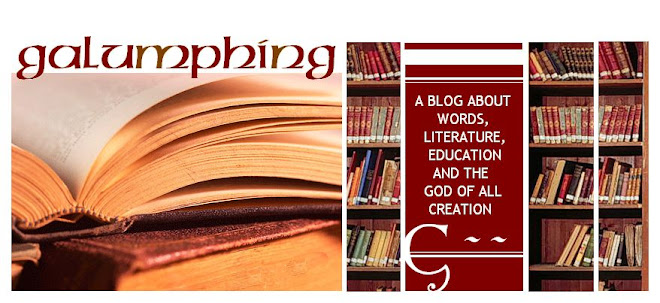I think I am teaching myself to be a dinosaur... that is, extinct. I read Virgil and Homer for pleasure, I teach Latin and Classical civilization courses, and I am presently embarking on a whirlwind tour of hell, courtesy of Dante.
C.S. Lewis, in his inaugural speech as Chair of Medieval and Renaissance Literature at Cambridge university, called himself a "dinosaur". What he meant by that was he considered himself to be a rare breed of man, the classically educated man, the man of letters, a true product of Western civilization as it once was. I am not a dinosaur in that sense, nor will I ever be. I am a product of "New Western civilization" whether I like it or not. I did not grow up with tales of heroes and monsters, but rather with Sesame Street, Mr. Rogers, and Loony Tunes. In the late 1950s, C.S. Lewis already considered the world a totally different place than the world he grew up in. Nevertheless, I persist in my attempts to "repair the ruins" of a long, lost culture and civilization. But I wonder if I am like a Roman studying Cicero or Ovid while barbarians are at the gate. Am I training myself for a civilization that no longer exists or can no longer exist? There are no time machines.
Although my goals as an educator and as a student of literature, history, and philosophy are no longer considered relevant in a world steeped in ignorance, self-centredness, and apathy, my only hope is the fact that I am a Christian. Christianity is the one and only perfectly universal truth in the universe. I am not talking about "cultural or social Christianity" but Christianity itself. Christianity is trans-temporal, trans-cultural, trans-denominational, trans-everything. Cultural or social Christianity, which can be quite a different thing, has been imported, sometimes imposed (intentionally or unintentionally) on cultures by varying military, colonial, political, and missionary efforts throughout history. When I distinguish "Christianity" as unique, I am referring to when the Gospel of Jesus Christ truly takes hold of someone, powerfully and transformatively. A Christian is someone who has become catholic in the universal sense... a follower of Christ, the God-Man---not just Christian ideas---but the person of Christ. We become part of the everlasting, eternal, and living body of Christ.
So, I may be training myself to be dinosaur-like in terms of literature and philosophy and education. As a teacher, I may become extinct... replaced by a website or a podcast or nothing at all. Although the sun is setting on Western civilization, I will not despair. Christ is my only hope. He should always be my ultimate and only hope. Perhaps the demise of Old Western civilization is, in part, a result of misplaced hope. As beautiful and true and powerful as Homer or Virgil or Dante might be, it can never save a person, much less a civilization. If we did recover the "Lost Tools of Learning" as Dorothy Sayers calls it, we will only produce "clever devils", as Lewis puts it.
Thursday, December 02, 2010
A dinosaur who reads Homer
Labels for the tulgey wood:
C.S. Lewis,
Christianity,
Classical Education,
Teaching
Subscribe to:
Posts (Atom)



